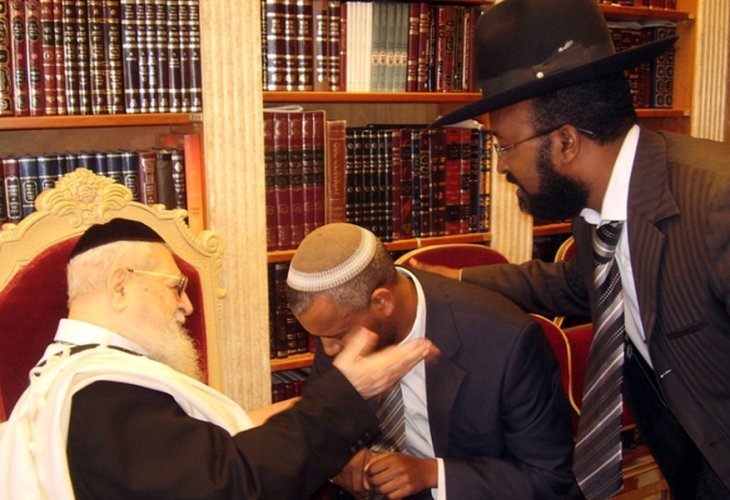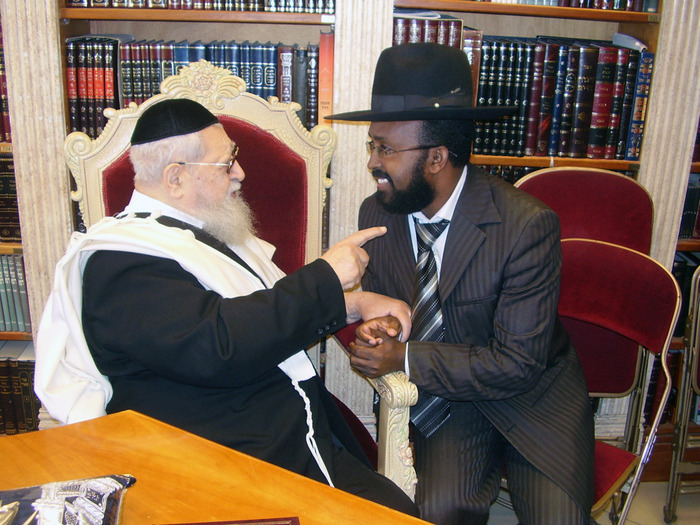Rabbi Mezur Beheina: "I'd Rather Solve the Maharsha's Challenges Than Face Parents Whose Children Were Denied School Acceptance"
Rabbi Mezur Beheina endured a challenging journey to the Holy Land, only to encounter doubts about the Jewish identity of the Ethiopian community. In an emotional interview, he pleads: "Let's cultivate peace among the people of Israel."

Rabbi Beheina's journey to the Land of Israel can be summed up in one word: 'suffering.' He was born in Ethiopia and immigrated in 1983. "There wasn't a special operation at the time, but there was a significant immigration," he recounts. "All the Jews who wanted to immigrate gathered in Sudan, where there was a sort of 'transition camp' overseen by the Jewish Agency and other bodies on behalf of the State of Israel. We had to be very cautious because the locals and authorities were not supposed to know our identities or that we were Jews aiming to reach the Land of Israel."
How long did you stay in the transition camp?
"Each person according to their luck; some stayed in the camp for six months, and others for three years. The suffering in the camp was terrible; we spoke a different language than the locals, there was unending hunger, and we had to work to support ourselves. Even the women and children worked all day. It's not just the physical suffering but much more than that—many left lives of luxury and abundant livelihood behind to ascend to 'Zion.' Personally, I recall those days as one of the hardest periods of my life."
And how do you explain your willingness to endure such a hard process to reach the land?
The only explanation I have is that we simply felt redemption was at our doorstep. That led to a real influx at the time; people didn't even sell their belongings but left everything behind, asked no questions, and hurried to that camp in Sudan to fulfill the dream of immigration to the land.
"We felt we'd been in exile long enough," continues Rabbi Beheina. "For years, we dreamed of reaching the Land of Israel. We always blessed while facing Jerusalem; our rituals were directed towards Jerusalem, every sacred act was performed facing Jerusalem, and now we felt this was our chance to reach the holiest city in the world. For that, we were willing to give up everything."
Jewish Heritage
Rabbi Beheina was only about eleven years old when he stayed in the Sudanese camp. "I was with my mom, brother, and a group of family members. We stayed there for a year and a half, and then my mother, in her wisdom, realized we were still not scheduled to leave, so she encouraged me to join my relatives to immigrate with them to the land. It was an unimaginable bravery—to undergo the entire immigration journey alone, without my mother—but I agreed, and indeed I flew with the relatives."
According to Rabbi Beheina, the flight was not direct. "We couldn't let the authorities understand we were flying to the land, so we presented ourselves as tourists and stopped in a European country for three weeks. Only then did we continue and arrive in Israel."
And who awaited you in the land?
"In the land, representatives of the agency and other organizations awaited us. They took us to various concentrations across the country and scattered us. I arrived at Or Akiva, and the truth is that at that moment, I thought I was already in Jerusalem, and I tried to look for the Western Wall in the streets... only later did I realize not all of Israel is Jerusalem."
 Former MK Beheina Mezur with Rabbi Ovadia Yosef (courtesy of those photographed)
Former MK Beheina Mezur with Rabbi Ovadia Yosef (courtesy of those photographed)The disappointment was short-lived, for a few days later, the new immigrants were taken on a tour to the Western Wall and other holy places. "For me, it was a dream come true," says Rabbi Beheina. "I was truly happy. Moreover, my older brother already lived in Israel, in Pardes Hanna, and when he heard I had arrived, he hurried to take me to his home, so I received devoted care until my mom and brother also immigrated. Eventually, I was united with them, and we all settled in Or Akiva."
Overall, Rabbi Beheina notes that the welcome they received in the land was wonderful, yet he still has yearnings for the glorious past of the Ethiopian community. "Not many know, but the community in Ethiopia was known for particular stringencies on various Jewish topics, especially family purity. Our mothers meticulously observed these with an unparalleled devotion. Additionally, our Shabbat was kept to the highest standards. We didn’t even wear belts as it supposedly required effort, and no effort was deemed fit on Shabbat. The men wore long white dresses on Shabbat and went to pray. Then, we would gather as a family and eat *'mashat'*—a special bread baked in honor of the holy Shabbat, with a unique fragrance."
"We were also very stringent during Passover. On the eve of the holiday, we would build a special oven and for seven days only eat matzot baked in that oven because there was no such thing as 'koshering utensils.' We would milk and drink the milk on the same day and slaughter meat on the same day. We were meticulous in the commandments in an indescribable manner. I miss those days."
But it is precisely because of the wonderful tradition in Ethiopia, notes Rabbi Beheina, that he is often hurt when there are claims that the Ethiopian community should convert, and they do not recognize its roots.
"It pains and saddens me deeply," he says with sorrow, "and in one of the instances when they discussed this topic with me, I simply suggested that all those raising these claims should ask the non-Jews in Ethiopia who Jews are. Our community suffered terrible persecutions for years from the non-Jews living around, who tried to convert us to Christianity. We did everything to maintain our Judaism. So maybe indeed they should talk to them and understand what a glorious community we are?"
Into Politics
Rabbi Beheina studied in his youth at a small yeshiva in Bnei Brak, then continued to the large 'Porat Yosef' yeshiva in Jerusalem. "I wanted to be as ultra-Orthodox as possible," he explains, "and Hashem helped me connect with the right rabbis and institutions most suited to me."
He later moved to live in Be'er Sheva, where he also established his home. After a short period, he found himself serving on the city council for about four years, during which he tried to do much for the Ethiopian community in the city. For a certain period, he even served as a Knesset member on behalf of the Shas party.
"I really don’t know how I reached my position in the Knesset," he answers when asked about his path into politics. "I truly didn't intend to and didn't want to, but when they offered it to me, I decided to take on the role anyway, with my sole goal being to help my community and the observant public throughout the land."
Currently, Rabbi Beheina serves as the rabbi of the Ethiopian community in Be'er Sheva and speaks with satisfaction about the fact that in recent years, more Ethiopian communities are emerging in many concentrations across the land. "There are synagogues opening for Ethiopians, many are returning to religious observance among young men and women, and throughout the journey, there is an unceasing rise. The only issue is with educational institutions where our community's children aren't always accepted, causing terrible distress among families. Truthfully, I'd rather tackle the most complicated question of the Maharsha than stand before parents weeping that they have nowhere to send their child next year."
But he chooses to end with hope: "We've endured difficult trials over the years, and I'm sure we'll overcome this trial too, especially during these days of the Three Weeks when we so need unity and drawing close of hearts. So let's unite, love each other, and be together with all the tribes of Israel."

